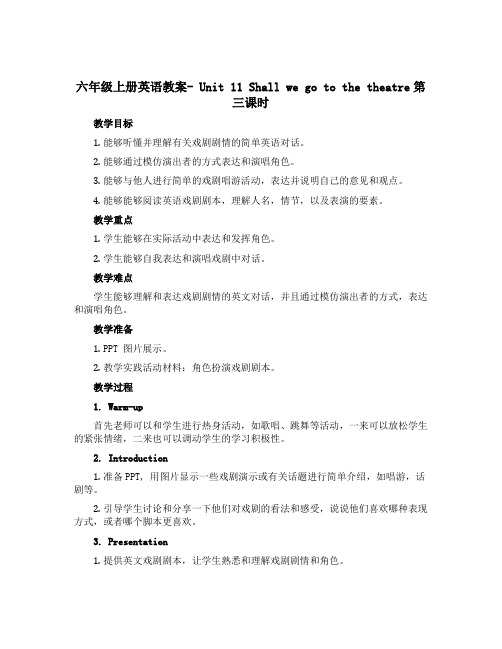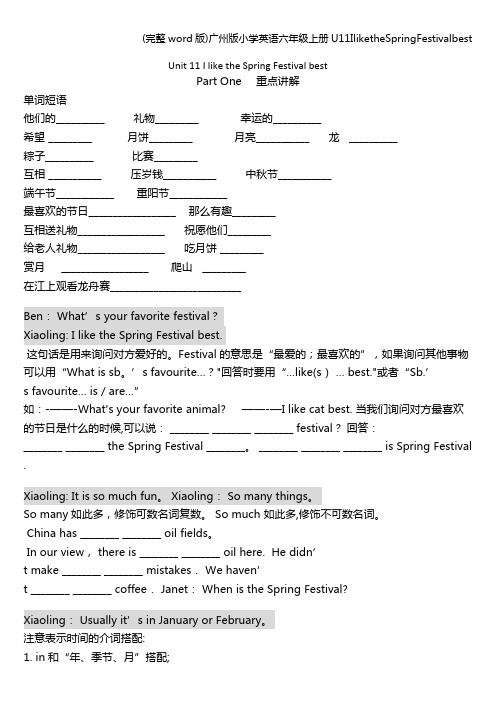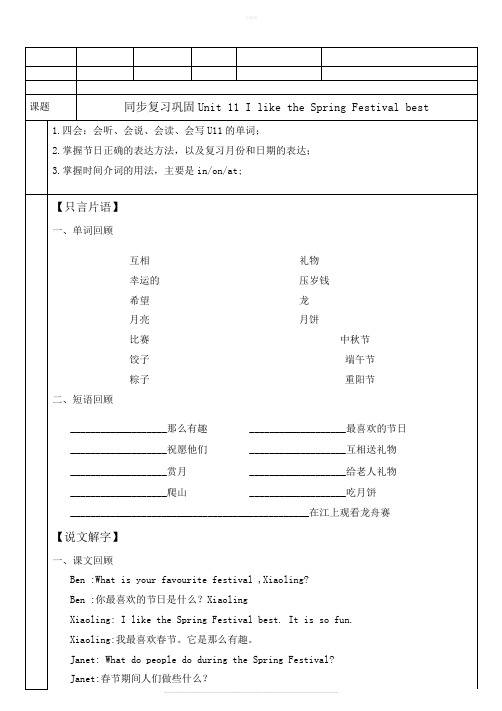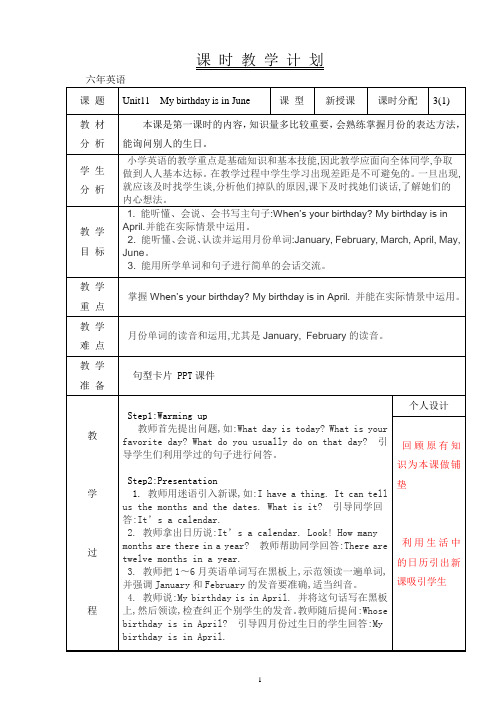2016新版广州六年级英语上册U11详细教案
六年级上U11第1课时

give some lucky money get some lucky money
jiaozi clean their houses buy new clothes have a big dinner with jiaozi What do people eat /do during Spring Festival? They eat jiaozi and clean their houses......
1.I like Dragon Boat Festival best 2.My favourite festival is Dragon Boat Festival.
face--race watch the dragon boat eat zongzi races on the river What do people eat/do during Dragon Boat Festival? They eat zongzi and watch the dragon boat zongzi
Chongyang Festival
What is your favoutite festival? 1.I like Chongyang Festival best. 2.My favourite festival is Chongyang Festival.
give old people presents
义务教育教科书英语(广州版) 六年级上册
Module 6 Festivals
Period 1
执教人:常娜娜
教学内容和目标
内容:1. Unit11 new words and sentences. 2.初步感知课文。 目标:1.认识相关节日,掌握unit11的单词和短语 2.能听说并问答以下句型,并谈论自己喜欢 的节日。 • What is your favourite festival? • What do people eat/do during the festival?
六年级上册英语《Unit 11 Dialogue》教学设计

六年级上册英语《Unit 11 Dialogue》教学设计
六年级上册英语《Unit _ Dialogue》教学设计Objectives:
教学目标
nguage knowledge语言知识:
Vocabulary: did ,didn t
Sentence : Who s calling?
Did ? Yes, did. / No, didn t.
nguage skill语言技能:,能听懂朗读课文对话。
3.Affect 情感态度:在学习过程中,培养学生关心他人的习惯。
4.Learning Strategies学习策略:通过听录音,阅读,提高学生的英语能力。
Difficulties Analysis
教学难点分析:本课的课文较长,课文的理解与上口是一个难点与重点,另外,电话用语的正确运用也是本课的重点。
Teaching
Aids/Media
主要教学媒体
1、教学课件,使用于课文的呈现。
2、图片。
Teaching Resource
教学资源:配套的教学课件。
六年级上册英语教案- Unit 11 Shall we go to the theatre第三课时

六年级上册英语教案- Unit 11 Shall we go to the theatre第三课时教学目标1.能够听懂并理解有关戏剧剧情的简单英语对话。
2.能够通过模仿演出者的方式表达和演唱角色。
3.能够与他人进行简单的戏剧唱游活动,表达并说明自己的意见和观点。
4.能够能够阅读英语戏剧剧本,理解人名,情节,以及表演的要素。
教学重点1.学生能够在实际活动中表达和发挥角色。
2.学生能够自我表达和演唱戏剧中对话。
教学难点学生能够理解和表达戏剧剧情的英文对话,并且通过模仿演出者的方式,表达和演唱角色。
教学准备1.PPT 图片展示。
2.教学实践活动材料:角色扮演戏剧剧本。
教学过程1. Warm-up首先老师可以和学生进行热身活动,如歌唱、跳舞等活动,一来可以放松学生的紧张情绪,二来也可以调动学生的学习积极性。
2. Introduction1.准备PPT, 用图片显示一些戏剧演示或有关话题进行简单介绍,如唱游,话剧等。
2.引导学生讨论和分享一下他们对戏剧的看法和感受,说说他们喜欢哪种表现方式,或者哪个脚本更喜欢。
3. Presentation1.提供英文戏剧剧本,让学生熟悉和理解戏剧剧情和角色。
2.请几个学生来表演戏剧并进行模仿演出者的唱游,其他学生可以根据自己的喜好,选择表演和演唱自己的喜欢角色。
3.学生可以根据要求进行表演或者进行唱游。
表演者可以根据自己的角色,即兴编造自己的话语或者动作,唱游者可以根据戏剧内容,自由地发挥想象,当然也要忠实于戏剧剧情。
4. Practice面对这么有趣的授课形式,学生会自然而然地流露出自己的喜好和爱好,这时快要进行下一步的教学时,为了让这份热情得到延续,老师可以带领全班学生,一起进行戏剧唱游练习。
1.大家根据册上剧本,《Shall we go to the theatre》进行角色扮演,练习自己的发音,不断地重复,直到掌握剧本的情节表达。
2.选择最感兴趣的角色出现,并进行优美的表演,让自己的角色感化所有的人。
六年英语上教学设计Unit11(2)

六度年英语
课题
Unit11
课型
新授课
课时分配
3(2)
教材
分析
本课是上一课的延续,继续巩固本单元所学词汇及句型。学生已基本掌握了句型,学生通过阅读小故事,创编对话等形式运用所学句型,以达到灵活运用的目的。
学生
分析
对于音标教学学生学起来很难,虽然有了一定的基础但还要重点讲解指导。在原来的基础上加强朗读发音。
2.教师先将单词写在黑板上,领读单词theatre,然后把音标/iə/写在黑板上,领读音标和单词。教师带领学生学习deer,写出音标/iə/。请同学想出具有相同读音/iə/的单词,如hear, beer, fear, dear。
3.再看单词pear,教师领读pear,把音标写在黑板上,领读音标和单词,请同学说出具有相同读音/eə/的单词,如bear, hair, fair等。请同学齐读,教师正音。
准备
动词短语卡片。
教
学
过
程
Step1:Warming up
1.Free talk.
What are you going to do on your next birthቤተ መጻሕፍቲ ባይዱay?
What do you want for your birthday?
Step2:Presentation
1.教师出示Check, match and read中的课文图片,让学生说出单词和其中包含的(元音)字母组合。
8.教师引导学生们再读课文,回答文后问题。建议小组合作解决第二个问题,请一位学生扮演老师提问组内其他同学。最后各小组在全班做汇报交流。
9.学生跟录音读课文,然后分角色朗读课文。
Step3:Practise
广州版英语六年级上册讲义:Unit 11 I like the Spring Festival best

Unit 11 I like the Spring Festival bestFocus PointsLet’s TalkWhat is your favourite festival? Why do you like it most? Please talk about your idea with partners. Warming Up一.听写__________________________________________________________________________________ __________________________________________________________________________________ __________________________________________________________________________________ __________________________________________________________________________________ __________________________________________________________________________________ __________________________________________________________________________________ 二.单词及短语1.他们的______________________2.互相________________________3.礼物________________________4.幸运的______________________5.压岁钱______________________6.希望________________________7.中秋节______________________ 8.月饼________________________9.赏月________________________ 10.比赛_______________________11.节日_______________________ 12.春节_______________________13.在......期间_________________ 14.听起来_____________________15.爬山_______________________ 16.最喜欢的___________________17.在江上_____________________ 18.给老人礼物_________________三.课文内容根据提示把短文补充完整。
六年级上册英语教案 Module 6 Festivals Unit 11教科(广州)

Module 6 FestivalsUnit 11 I like the Spring Festival bestPeriod 1教学目标1. Language knowledge语言知识:Vocabulary词汇:Spring Festival, Dragon Boat Festival, Mid-Autumn Festival, lucky money, eat, mooncake.Sentences句型:1. What is your favourite festival?2. Wha t do people do during…festival?3. When is the…festival?Daily Express:So much fun. It sounds great.nguage skill语言技能:如何谈论节日。
教学重点难点1. 本课时词汇多,课文长,但内容容易理解,并且能与实际生活密切相连。
2. 个别需要掌握的重点句型较长和难以上口,需要多次朗读和创造语境帮助学生理解。
教学过程Warm up:1. Free talkT: What festival do you know?2. Revise some festivals learned.T: When is the…festival?Presentation and Practice1. 看图猜节日,引出各种节日对应活动的短语2. 延续上一环节的图片:呈现问句操练:What do people do d uring…festival? People usually…老师换着各种节日的图问学生3. 以短文阅读方式,通过听力练习,让学生通过练习了解Spring Festival的习俗。
When?What do people do during…?Why children love Spring Festival in China?4. 承接上一话题,引入课文的学习。
六年级英语上册《Unit11Shallwegotothet

六年级英语上册《Unit11Shallwegotothet六年级英语上册《Unit 11 Shall we go to the theatre ?》教案Teaching aims and demands:1、Learn the words & phrase: theatre,cinema,watch.2、Can master the sentence “ Let’s go to …”.Teaching methods:games, reading, action, etc.Period IContent of courses:Teaching aims and demands:Be able to master the words: theatre,cinema,watch.Educational affiliations:textbook, tape, tape-recorder, and word cards.Teaching-learning process:Step 1 Warm-up activity1、Greeting.2、Let’s play: Look and guess: What is it?Step 2 Presentation&drill1、Learn to say: picnicT help Ss understand the meaning. Read the word after T.2、Learn to say: libraryT help Ss understand the meaning. Read the word after T.3、Learn to say: watch science story in the same way.4、Drill.(1)T shows the pictures and Ss say the words.(2)T shows the pictures quickly and Ss say the words.(3)A guessing game.4、Open the books at Page 10, listen to the tape and read after it.Step 3 Practice.1、Practice in four. Ss play the cards.2、Listen&act.Step 4 Consolidation.Period IIContent of courses:textbook Part A Part C.Teaching aims and demands:Be able to understand and tell the story.Educational affiliations:textbook, tape, tape-recorder, word.Teaching-learning process:Step 1 Warm-up activity1、Exchange greetings.2、Sing a song we’ve learned last term together.Step 2 Presentation&drill1、Lead-in.T shows the picture of Part A.T says, “The children are talking. Listen to the tape. What are they talking about?”T writes the sentence on Bb and help Ss understand the meaning. Read the sentence after T.2、Ss talk about the picture.3、Drill.(1)T shows the pictures and Ss rearrange them.(2)T shows the pictures and Ss tell the story.(3)A guessing game.4、Open the books at Page 9, listen to the tape and read after it.Step 3 Practice.1、Fill the blanks with the correct words.Go/and/did/was/home listYesterday_________a holiday. The children wanted to _________out. They did not want to stay at_________. Peter wrote a _________in his notebook. The children had many ideas.They talked_________talked. It was very late in the afternoon.They_________ nit go out. They stayed at home all day!2、Ss practice in four.3、A game:A competition among groups.Period IIIContent of courses:1、Teaching aims and demands:Be able to read and write the sentence ” Let’s go to…”.2、Educational affiliations: textbook,tape,tape-recorder,word.Teaching-learning process:Step 1 Warm-up activity1、Exchange greetings.2、Sing a song we’ve learned last term together.Step 2 Practice1、Lead-in.(1)T shows the picture of Part D.(2)T says, “What are these place?2、Pair work. Look at pictures. Say the words of the pictures.3、T writes the words on Bb and help Ss understand the meaning.Read the sentence after T.4、Say the felling words..5、Make the sentences.e.g.I’m hungry. Let’s go to the restaurant.6、Open the books at Page 11.Ss write the sentences on the book.。
六年级上unit11小学英语广州版教案

六年级上unit11小学英语广州版教案关于六年级上unit11小学英语广州版教案一、教学内容分析Unit 11二、教学目标(一)语言知识目标1.“四会”掌握词汇:history2. 短语:check the number, leave a message, give…a message for me, ask…to…,need to, a/an music/maths/P.E./art/science/history lesson3. 句型和日常用语Who’s calling, please? This is … speaking.Is that …? Sorry, wrong number.Would you like to leave a message? No, thanks. I’ll call back later.Did the children have a/an …lesson yesterday afternoon?N o, they didn’t. They had a … lesson.(二)语言技能目标1.能准确运用打电话用语进行电话交流。
2.能实际运用本课所学的语言知识。
(三)学习策略目标积极投入语言情景、体验生活;提倡小组合作,共同完成任务。
(四)情感态度目标增强兴趣,提高学习自信心。
三、教学重、难点1.正确运用各种否定缩写词。
2.能正确运用所学语言进行交际活动。
四、教学策略1.利用图片、录音和教学软件,辅助教学。
2.相对应的各种听说训练和句型操练,提高学生解题和做题的能力。
3.采用歌曲、顺口溜、游戏等形式进行活动教学,让学生在小组合作中,增强学习自信心。
五、教学过程(一)复习热身1.播放歌曲Happy T alk,师生一起唱。
2.Free talk, 揭示本课学习目标。
(通过师生对话或生生对话,提高学生的语言表达能力)(二)呈现、操练与巩固方法一:配对游戏:准备两组卡片,分别是缩写词(如isn’t)与非缩写词(如is not);请学生手拿卡片找朋友,对对碰(如isn’t对is not),然后读出单词的发音,老师适当正音,如:won’t, weren’t。
(广东版)开心英语六年级上册《unit11》教案设计

《(广东版)开心英语六年级上册《unit 11》教案设计》教学内容:本节课教学内容为人教版小学英语六年级上册《Unit 11》。
本单元主要围绕“过去时态”展开,通过描述过去的经历,让学生掌握一般过去时的用法。
教学内容包括词汇、句型、语法和听力四个部分。
词汇部分主要学习与过去经历相关的单词;句型部分主要学习描述过去经历的句子;语法部分主要学习一般过去时的构成及用法;听力部分主要训练学生对过去时态的听力理解能力。
教学目标:1. 知识与技能:学生能够掌握本节课的词汇和句型,并能运用一般过去时描述过去的经历。
2. 过程与方法:通过情境创设、小组合作、任务驱动等教学方法,培养学生运用英语进行交流的能力。
3. 情感态度与价值观:培养学生对英语学习的兴趣,增强学生的合作意识,提高学生的自信心。
教学难点:1. 一般过去时的构成及用法。
2. 描述过去经历时的词汇和句型运用。
教具学具准备:1. 教具:多媒体设备、PPT课件、黑板、粉笔等。
2. 学具:教材、练习册、笔记本、彩色笔等。
教学过程:1. 导入利用图片或视频展示一些与过去经历相关的事物,引导学生谈论自己的过去经历,激发学生的学习兴趣。
2. 新课展示(1)呈现词汇:通过图片或实物展示本节课的词汇,引导学生学习并记忆。
(2)句型学习:通过情景创设,让学生在实际语境中学习并运用句型。
(3)语法讲解:结合例句,讲解一般过去时的构成及用法。
(4)听力训练:播放与本节课内容相关的听力材料,训练学生的听力理解能力。
3. 小组活动将学生分成小组,每组选择一个过去经历的话题,运用本节课所学的词汇、句型和语法进行讨论,并准备进行课堂展示。
4. 课堂展示各小组轮流上台展示自己的讨论成果,其他同学进行评价和补充。
板书设计:Unit 11 过去时态一、词汇二、句型三、语法四、听力作业设计:1. 复习本节课的词汇和句型,并运用一般过去时描述自己的过去经历。
2. 完成练习册上的相关练习。
广州版六年级上册英语教案 Module 4 Unit 11(3)

广州版六年级英语上册教案UNIT 11 Who's Calling?一、教学内容分析Unit 11 Dialogue二、教学目标(一)语言知识目标1.“四会”掌握词汇voice, number, goodbye, did, hear, said, had, felt, didn’t, take2. 进一步掌握运用电话用语。
3. 初步理解和运用间接引语句式: She/He said she/ he had… 转述第三方的话语。
(二)语言技能目标1.能听懂、熟读课文,并能背诵课文中有用的句子,在课文中提取有关的信息完成各项任务。
2.进一步学习运用各种时态于电话交流中。
(三)学习策略目标在情景中理解课文,在做任务中提高听、说、读、写的能力。
(四)情感态度目标在互动学习中培养主动探究的精神、乐学爱学的情绪。
三、教学重、难点1.课文的理解和朗读。
2.各类时态的转换和运用。
四、教学策略1.抓住中心,理顺环节,设置任务。
2.引导学生求大同存小异演绎课文,减轻背诵的难度。
五、教学过程(一)热身与复习1.朗读小诗。
(热身,通过动作、节奏,激发学生学习的兴趣。
)2. 游戏:小组比赛,看谁答得快。
(通过录音或图片,创设不同的情景,锻炼学生的语言反应能力。
)(1) 对方电话响起,但无人接,你会说什么?No answer…(2) 你的电话响了,当你接上电话时你会说什么?Hello, this is …(3) 通过电话你想跟某某说话,你会说什么?May I speak to…? / Can I speak to …?(4) 你接电话,但对方不是找你,是找你妈妈,而你妈妈不在家,你怎样和对方说?She’s not here. I’m afraid…Can I take a message?(5) 你接电话,对方找的正是你,你会说什么?Speaking /This is…speaking. Who’s calling/who’s that, please?(二)呈现与操练听对话录音2次,回答下面的问题, 有一部分可作选择形式(屏幕显示):(通过听录音,初步理解课文,并能抓住关键词,正确回答老师的问题。
(完整word版)广州版小学英语六年级上册U11IliketheSpringFestivalbest

Unit 11 I like the Spring Festival bestPart One 重点讲解单词短语他们的__________ 礼物_________ 幸运的__________希望 _________ 月饼_________ 月亮___________ 龙 __________粽子__________ 比赛_________互相 ___________ 压岁钱___________ 中秋节___________端午节____________ 重阳节____________最喜欢的节日__________________ 那么有趣_________互相送礼物__________________ 祝愿他们_________给老人礼物__________________ 吃月饼 _________赏月 __________________ 爬山 _________在江上观看龙舟赛___________________________Ben: What’s your favorite festival?Xiaoling: I like the Spring Festival best.这句话是用来询问对方爱好的。
Festival的意思是“最爱的;最喜欢的”,如果询问其他事物可以用“What is sb。
’s favourite…?"回答时要用“…like(s)… best."或者“Sb.’s favourite… is / are…”如:-——-What's your favorite animal? ——-—I like cat best. 当我们询问对方最喜欢的节日是什么的时候,可以说: ________ ________ ________ festival?回答:________ ________ the Spring Festival ________。
英语六年级上册Lesson11 教案

小学“英语”学科课题目标备课
李庄子中心小学“英语”学科课题备课
板
书
设
计
课题:
教学反思通过本课的教学我发现多媒体能有效促进教学,在本课教学中我充分运用多媒体教学,成功的将本课教学任务完成,在教学中多媒体完整展现了文本内容,图画界面增强了学生学习的积极性,配以声音完全给学生一个全新的感觉。
在教学引入时生活动态画面的展现能完全联系实际,促进学生通过亲身体验,主动进入课堂,增强了学生学习的兴趣。
在文本教学时,多媒体的进入把枯燥的文本知识转化为学生乐于接受的音画界面,使学生感觉到新奇和刺激,促进了学生学习的主动性,在自由练习时完整的画面能促进学生快速记忆,准确练习,保证了学习时间,多媒体是英语课堂的好助手。
广州版英语六上《UNIT 11 Who’s Calling》word教案(一)

广州版六年级英语上册教案UNIT 11 Who's Calling?一、教学内容分析Making telephone activities二、教学目标(一)语言知识目标1.巩固学习并运用在每个单元的“四会”词汇。
2.巩固学习和运用电话用语。
(二)语言技能目标1.能表演打电话的情景。
2.能用所学的各种时态进行电话交流。
3.能用所学的知识,根据情景自编电话交谈内容。
(三)学习策略目标通过模拟真实打电话的情景体验与别人交流的策略。
(四)情感态度目标1.培养学生主动、积极、热情的交往意识。
2.培养学生勇于克服困难、乐于合作的品格。
三、教学重、难点各种生活情景的电话交流。
四、教学策略营造浓厚的学习氛围,创设生动的生活情景,采用活动课的教学模式让学生活用语言和发展语言。
以小组为单位展开说话比赛、对话比赛。
五、教学过程(一)引入全班围坐成一个圈或两个圈,1.师生有节奏地拍掌齐唱Happy Talk2.速度稍快拍掌诵读小诗Rhyme(热身,为完成以下的任务作铺垫)(二)前任务(为做任务做准备)游戏《击鼓传球》音乐一停,球落在谁手,谁就要说一句电话用语,并分A,B 栏贴在黑板上。
由于是活动课,应该让“活”和“动”的气氛贯穿整课。
学生应该是从头至尾充满热情、充满竞争意识参与活动。
歌曲Happy Talk和小诗Rhyme从每课时开始就已经让学生反复听和跟读,到第六课时学生已能朗朗上口,节奏感和韵律味都会很强。
可以说,教材中的歌曲和小诗都不用专门教,就像学生喜欢的流行曲一样,听多了自然就能上口了。
第三项的游戏也是为了让学生回顾说出单个句子,为后面的模拟电话交流作语言库准备,在这里所谓的电话用语,其实面是很宽的,老师应该引导学生知道,生活中的衣、食、住、行、生、老、病、死的活动都可以通过电话交流,因此学生的电话用语输出量就很大了。
(三)做任务(屏幕图示4幅图),1.老师说:Look at these pictures, Can you talk something about these pictures? 1.家明睡在病床,一个医生正和他的妈妈谈话。
广州版英语六年级上册Unit 11《I like the Spring Festival best》word教案

Unit 11 I like the Spring Festival best【单词回顾】他们的__________ 礼物_________ 幸运的__________ 希望_________ 月饼_________ 月亮___________ 龙__________ 粽子__________ 比赛_________ 互相___________ 压岁钱___________ 中秋节___________ 端午节____________ 重阳节____________一、短语:the Spring Festival, lucky money, each other, Mid-autumn Festival, Dragon Boat Festival, Chongyang Fesvital…二、句子:1. What’s your favorite festival?2. I like the Spring Festival best.3. What do people do during the Spring Festival?4. When is the Spring Festival?5. It sounds great.三、重点精析:1. We wish them a happy Spring Festival. 我们祝愿他们春节愉快。
辨析:wish和hope的区别:wish表示“希望”(大多难以实现或与事实相反),往往带有“祝愿”意味。
而hope 表示的“想”和“希望”是可以实现的。
hope后不能接动名词作宾语,也不能用hope sb. to do sth.结构。
它们后面可以接从句。
如:我想见你们的经理。
__________________________但愿我能象鸟一样飞。
________________________I hope he can do that.我希望他能干那件事。
(本句表示有可能实现的一种希望,can不能用could代替。
六年级上册U11第1课时

lucky money
Parents usually give lucky money to their children during the Spring Festival.
People often get together and have a big dinner with jiaozi and lots of other delicious food at the Spring Festival.
1.Read in groups. 2. Read together in class.
Let’s try to retell.
clean the houses buy new clothes
give lucky money
wish each other… have a big dinner with…
3. What do people do during the Spring Festival? People usually clean their houses and buy new clothes to make everything new and fresh.
4. Do children give each other gifts? No, they don’t.
Retell the dialogue with the key words together:
festival
Spring Festival
date
in January or February
clean their houses
What do people do ?
buy new clothes to make everything new and fresh parents give their children lucky money go to visit their family wish them a happy Spring Festival have a big dinner jiaozi and lots of other delicious food
2016新版广州六年级英语上册U11详细教案

Xiaoling: So many things. The Spring Festival is the Chinese New Year ,so people usually clean their houses and buy new clothes to make everything new and fresh.Xiaoling:那么多东西。
春节是中国的新年,因此人们通常打扫房子,买新衣服,让所有东西都像是新的。
Ben :And do you give each other gifts?Ben :你们互相送礼物吗?Xiaoling: Children don’t give gifts, but parents will give their children some lucky money. So we all love it.Xiaoling:孩子们不送礼物。
但父母亲会给孩子们一些压岁钱。
因此我们都喜欢它。
Janet: When is the Spring Festival?Janet:春节是什么时候?Xiaoling: Usually it is in January or February. We will go to visit our family and wish them a happy Spring Festival .We will also have a big dinner with jiaozi and lots of other delicious food.Xiaoling:它通常在一月或者二月。
我们还会吃一顿包括饺子和其他美味食物的大餐。
Ben :It sounds great.Ben :这听起来太棒了。
二、句子回顾A.翻译下列的句子春节是什么时候?______________________________________________________________________________它通常在一月或者二月。
六年级上册教案Unit 11

Unit 11 When are we going to swim?Teaching aims and demands:1Learn the words: beach/ dangerous/ swimming suit .2Can master the sentence ”When are we going to … ?” and answers. Teaching methods: games, reading, action, etc.Calendar plan:Period ArrangementsPeriod 1 Part B Part APeriod 2 Part D Part CPeriod 3 Part F Part EPeriod 1Teaching targets.1. The target of knowledge:1) Learn these new words:bench,sand,dangerous,swimming suit2) Understand and retell the story3) Can use the sentence pattern: when are we going to do sth?The targets of skills:To perceive the Simple Future Tense: when are we going to do sth?To improve the ability of performing language comprehensivelyMain points : To perceive the special question of the Simple Future Tense: When are wegoing to do sth.Difficult point: Retell the storyTeaching aids : cards, tape ,record, picture etcTeaching Process:Step 1 Warming up1. Greetings.2. Sing a song:The days of a week3. Free talk:T: What are you going to do tomorrow?Ss: I’m going to …T: Are you going to …?…Step 2 Presentation and drill1. Lead in the new dialogue and learn the new words and sentence pattern:T: I’m so happy today,because I received a letter from my best friendQ iqi,she is in HainanIsland now.She sent me a photo,would you like to have a look?Show the photoT: Look!This is my friend what is she doing?Help the pupils to answer: She is sitting on the beach and playing sand.Write down the word,explain the meaning and lead readingLearn to say the words: beach, playing sandUse the same way to learn the other words:swimming suit and the topic sentence2. Listen and repeat3. Game—Loud and low voice4. Lead the new sentence patternWrite down the sentence pattern,learn to sayStep 3 Fast reading and listening1. Read the dialogue quickly ,then answer the following questionT: Summer holiday is coming ,Lingling and Dongdong are going to go out with their friendsWhat are Lingling and Dongdong going to do?What can’t Don gdong do first?2. Listen and imitation,require the pupils to master the difficult sentencesStep 4 Intensive readingHelp the pupils to understand the sentence patterns1) Reading the dialogue carefully2) Finish Part C(Pair work)Step 5 ConsolidationAct out the dialogue ,choose a pupil to act as a narratorEstimationHomework: Listen and repeat the text ,copy the words and sentencesPeriod 2Teaching targets.1) Can master and perform the new words :housewife ,stall,2) The simple future tense :be gong to do sth3) Can understand the Part DMain points : Master and perform the new words and phrasesDifficult point: The simple future tense:be going toTeaching aids : cards, tape ,recordTeaching Process:Step 1 Warming up1. Greetings.2. Sing a song3. Use the cards to go over the words:beach,sand,dangerous,etcStep 2 Presentation and drill1. Part DT: What can you buy in the fish shop?What can you get from the bank?What can you get from the market?Do you like reading?Where can you get books?When are you going to the bookstore?Help the pupils to understand the questions ,then answer the questionsWrite down the sentence patterns ,then lead readingWhen are you going to …I’m going to …at…Pair work,to discuss the pictures then finish the exercisesAct out the storyStep 3 PracticeFree talk,according to the following form:where when who WhatThe fruit shop After supper My mother Buy some fruitsThe bookstore This Saturday My brother Buysome books…………Step 4 Consolidation1) Situation: X-mas is coming ,your monitor is asking the arrangement of the party2) Estimation3) Homework: Listen and tell a story with the simple future tensePeriod 3Teaching targets.1) Can describe the picture of partE2) Can use the simple future tense to describe the future actions:be going to do sth Main points : Can use the simple future tense to describe the future actions Difficult point: Listening comprehensionTeaching aids : cards ,tape ,record etcTeaching Process:Step 1 Warming up1. Greetings.2. Sing a song:The days of a weekFree talk(about the simple future tense)T: Good morning ,are you going to have a computer lesson tomorrow?Ss: No,we are not.T: When are you going to have a computer lesson?Ss: We are going to have the computer lesson on Monday……Step 2 Presentation and drill1. Show a photoT: Look at this photo!Last Sunday ,I played with my friends ,we took some photos at the basketball court ,we had a lot of funWrite down the phrase ,lead reading2. Talk about the picture of Part EStep 3 Practice1. PartE1) Two students to discuss the pictures2) Finish writing exercise3) Finish listening exercisesStep 4 ConsolidationSunday …MondayTuesdayWednesday… ...1) a survey2) Estimation3) Homework: Listen and read the dialogue。
六年英语上教学设计Unit11(1)

7.请学生再听一遍Listen and say中的课文录音,在书上画出描述David和肖慧庆祝生日的动词短语:have a small party, eat birthday cakes, put candles on the cake, light the candles, make a wish, eat noodles and eggs,通过表述,让学生们总结东西方过生日时传统食物的异同。
教学
目标
1.能听懂、会说、会书写主句子:When’s your birthday? My birthday is in April.并能在实际情景中运用。
2.能听懂、会说、认读并运用月份单词:January, February, March, April, May, June。
3.能用所学单词和句子进行简单的会话交流。
课时教学计划
课题
Unit11 My birthday is in June
课型
新授课
课时分配
3(1)
教材
分析
本课是第一课时的内容,知识量多比较重要,会熟练掌握月份的表达方法,能询问别人的生日。
学生
分析
小学英语的教学重点是基础知识和基本技能,因此教学应面向全体同学,争取做到人人基本达标。在教学过程中学生学习出现差距是不可避免的。一旦出现,就应该及时找学生谈,分析他们掉队的原因,课下及时找她们谈话,了解她们的内心想法。
Step2:Presentation
1.教师用迷语引入新课,如:I have a thing. It can tell us the months and the dates. What is it? 引导同学回答:It’s a calendar.
- 1、下载文档前请自行甄别文档内容的完整性,平台不提供额外的编辑、内容补充、找答案等附加服务。
- 2、"仅部分预览"的文档,不可在线预览部分如存在完整性等问题,可反馈申请退款(可完整预览的文档不适用该条件!)。
- 3、如文档侵犯您的权益,请联系客服反馈,我们会尽快为您处理(人工客服工作时间:9:00-18:30)。
Xiaoling: So many things. The Spring Festival is the Chinese New Year ,so people usually clean their houses and buy new clothes to make everything new and fresh.Xiaoling:那么多东西。
春节是中国的新年,因此人们通常打扫房子,买新衣服,让所有东西都像是新的。
Ben :And do you give each other gifts?Ben :你们互相送礼物吗?Xiaoling: Children don’t give gifts, but parents will give their children some lucky money. So we all love it.Xiaoling:孩子们不送礼物。
但父母亲会给孩子们一些压岁钱。
因此我们都喜欢它。
Janet: When is the Spring Festival?Janet:春节是什么时候?Xiaoling: Usually it is in January or February. We will go to visit our family and wish them a happy Spring Festival .We will also have a big dinner with jiaozi and lots of other delicious food.Xiaoling:它通常在一月或者二月。
我们还会吃一顿包括饺子和其他美味食物的大餐。
Ben :It sounds great.Ben :这听起来太棒了。
二、句子回顾A.翻译下列的句子春节是什么时候?______________________________________________________________________________它通常在一月或者二月。
______________________________________________________________________________你最喜欢的节日是什么?______________________________________________________________________________我最喜欢春节。
______________________________________________________________________________春节期间人们通常做什么?______________________________________________________________________________人们通常打扫房子、买新衣服,让所有东西都像新的一样。
______________________________________________________________________________你们互相送礼物吗?______________________________________________________________________________父母会给孩子们一些压岁钱。
______________________________________________________________________________A.根据中文意思完成下列句子:1.My favorite festival is ________ ________(春节).2.I ____ (get) lots of ______ ________last year.上一年我拿到了很多的压岁钱。
3.They often give gifts to _____ ______(互相).4.I like _____ ______ ______ _______.(我最喜欢吃饺子。
)5.We usually eat mooncakes ______ ___________ ___________(在中秋节).6.People usually ______ _________ _____ __________ _________.(人们通常在重阳节那天去爬山。
)B. 根据中文意思完成下列句子:1.We can _____ _____ ______ _____(互相送礼物)on Christmas.2.I _____(希望)I can get many gift next year.3.Did you _____ ______ _______ ______during Spring Festival?(春节期间你有收到压岁钱吗?)4.They will have a race about _____ _________ (吃月饼)tomorrow.5.They _____ ______(吃午饭)together and ______ ______ (谈论关于)their officeyesterday.C. 用词的正确形式或根据首字母提示填空:A: What’ s your f________ festival?B: I like the C_______ New Year best.A: Does it come in S_________?B: No, it comes in January or F_________.A: Do you do h________ during the Chinese New Year?B: Yes, I help my parents clean the house.A: _______ you get any l_____ money last year?B: Yes, I g____ about eight hundred y______.A: Do you visit your friends, too?B: No, I always stay at home and watch TV.三、课文详解1. We wish them a happy Spring Festival. 我们祝愿他们春节愉快。
辨析:wish和hope的区别:wish表示“希望”(大多难以实现或与事实相反),往往带有“祝愿”意味。
而hope表示的“想”和“希望”是可以实现的。
hope后不能接动名词作宾语,也不能用hope sb. to do sth.结构。
它们后面可以接从句。
如:我想见你们的经理。
__________________________但愿我能象鸟一样飞。
________________________I hope he can do that.我希望他能干那件事。
(本句表示有可能实现的一种希望,can不能用could代替。
)2. It sounds great. 那听起来很棒。
Sound在这里作感官系动词,意思是“听起来”,后面常接形容词。
但它还可以作名词,表示“声音”,“响声”,还作形容词,表示“(睡眠)香甜的”。
3. wait for 等待如:他们正在等你。
_________________________4. What’s your favorite festival? 这句话是用来询问对方爱好的。
favorite的意思是“最爱的;最喜欢的”,如果询问其他事物可以用“What is sb.’s favourite…?”回答时要用“…like(s) … best.”或者“Sb.’s favourite… is / are…”如:----What’s your favorite animal?----I like cat best.5. Ben: What’s your favorite festival?Xiaoling: I like the Spring Festival best.这句话是用来询问对方爱好的。
Festival的意思是“最爱的;最喜欢的”,如果询问其他事物可以用“What is sb.’s favourite…?”回答时要用“…like(s) … best.”或者“Sb.’s favourite… is / are…”如:----What’s your favorite animal? ----I like cat best.当我们询问对方最喜欢的节日是什么的时候,可以说:________ ________ ________ festival?回答:________ ________ the Spring Festival ________.________ ________ ________ is Spring Festival.Xiaoling: It is so much fun.Xiaoling: So many things.6. So many如此多,修饰可数名词复数。
So much 如此多,修饰不可数名词。
China has ________ ________ oil fields.In our view, there is ________ ________ oil here.He didn’t make ________ ________ mistakes. We haven’t ________ ________ coffee.Janet: When is the Spring Festival?Xiaoling: Usually it’s in January or February.7. 注意表示时间的介词搭配:in和‘‘年、季节、月’’搭配;on和星期、日期以及‘‘有day的节日’’搭配;at 和‘‘点钟及没有day的节日’’搭配。
________10:00 a.m. ________ noon ________ Sunday________ night ________ Spring Festival ________October 12th________Sunday morning ________ autumn ________ the morning________ the morning of Oct. 12th ________ October ________ 2014________ a cold morning ________ the afternoon ________ Mid-autumn DayWe wish them a happy Spring Festival. 我们祝愿他们春节愉快。
